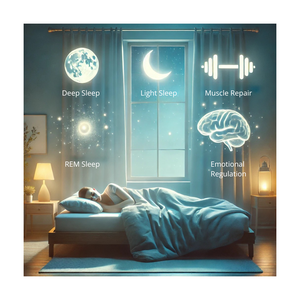Why Sleep Matters
Sleep isn’t just downtime—it’s when your body performs essential maintenance and repair. From rebuilding muscles to regulating hormones, quality sleep plays a critical role in every aspect of your health and fitness journey. Without it, your efforts in the gym, kitchen, and daily life are less effective. Here’s why sleep is your ultimate tool for building strength, losing weight, and improving overall wellness.

The Science of Sleep: Stages and Benefits
Understanding the Stages of Sleep
Sleep occurs in cycles that include different stages, each serving a unique function:
- Stage 1 & 2 (Light Sleep): Helps transition your body into rest and allows the brain to start processing memories.
- Stage 3 & 4 (Deep Sleep): Critical for muscle repair, immune system strengthening, and growth hormone release.
- REM Sleep: Supports brain activity, emotional regulation, and memory consolidation.
What Happens Without Adequate Sleep?
- Limited deep sleep can impair physical recovery and muscle growth.
- Insufficient REM sleep affects brain function, mood, and mental clarity.

Sleep and Physical Fitness
Why Sleep is Crucial for Building Strength
When you work out, your muscles experience tiny tears that need to repair and rebuild stronger. This process, called muscle recovery, happens during deep sleep. Growth hormone, often called the "fitness hormone," is released while you sleep, which is critical for muscle repair, tissue growth, and fat burning.
What Happens Without Enough Sleep:
- Reduced strength gains
- Prolonged recovery time
- Higher risk of injury
Sleep and Weight Loss
Sleep directly impacts your metabolism and hunger hormones—ghrelin (hunger) and leptin (fullness). When sleep-deprived, ghrelin levels increase while leptin levels decrease, making you feel hungrier and more prone to overeating. Additionally, lack of sleep can lower insulin sensitivity, making it harder for your body to burn fat.
What Happens Without Enough Sleep:
- Increased cravings for sugary, high-calorie foods
- Slower metabolism
- Difficulty sticking to a weight loss plan
Sleep and Mental Health
The Link Between Sleep and Emotional Well-Being
Your brain doesn’t shut off while you sleep—it works overtime to process emotions, solidify memories, and prepare you for a new day. Poor sleep can lead to anxiety, mood swings, and reduced motivation, making it harder to stick to your fitness goals.
The Science:
REM sleep (dream sleep) is critical for emotional regulation and mental clarity. Without it, your brain struggles to function at its best.
Sleep and Energy Levels
The Role of Sleep in Stamina and Performance
Ever tried working out after a bad night’s sleep? It’s tough. Quality sleep restores energy and ensures your body has the stamina to perform well, whether you’re lifting weights, running, or simply getting through your day.
What Happens Without Enough Sleep:
- Reduced endurance
- Poor workout performancw
- Increased fatigue throughout the day

Impact of Sleep Deprivation on Hormones
The Hormonal Connection to Sleep:
- Cortisol: Increased stress levels impair recovery and lead to fat storage.
- Testosterone: Reduced levels impact muscle growth and recovery, especially in men.
- Thyroid Hormones: Impaired sleep can slow metabolism, making it harder to lose weight or gain strength.
Sleep and Long-Term Health
Chronic Effects of Poor Sleep:
- Increased risk of conditions like heart disease, diabetes, and cognitive decline.
- Highlight the connection between lifelong health and consistent sleep habits.


